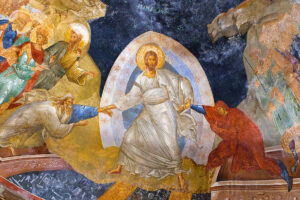As in the previous few years, the Order of St. Andrew was represented in this year’s Review Conference of the Organization for Security and Cooperation in Europe (OSCE), an international body with 52 members, which was convened in Warsaw, 30 September to 8 October 2010, to review progress of the member states in fulfilling the OSCE Charter. The Order’s leadership appointed two of its members, Mr. Theofanis Economidis, Archon Ekdikos, and Dr. Achilles G. Adamantiades, Archon Prostatis ton Grammaton, to represent the Order in two of its sessions: the first, Working Session 2, on Freedom of Thought, Conscience, Religion or Belief (to which Archon Theofanis made the first presentation) and the second, Working Session 3, on National Human Rights Institutions and the Role of Civil Society in the Protection of Human Rights (in which Archon Achilles made the presentation). The presence of a number of observer nations from North Africa, Asia, Australia and other regions (e.g., Egypt, Morocco, Israel, Afghanistan, Japan, Korea, Australia, and others) gave the Archons’ presentations a wider exposure.
The main purpose of the delegation and their papers was to highlight the violations of the rights of the Ecumenical Patriarchate, as well as of other religious minorities in Turkey, especially (i) the denial of its Ecumenical title, (ii) interference in the process of electing a new Ecumenical Patriarch, (iii) non-recognition of its legal personality, (iv) interference with free religious education (the 1971 closure of the Theological School of Halki); and (v) massive, illegal and arbitrary confiscation of properties of its institutions and foundations.
During the conference, it became clear that a large number of countries, including Turkey, that have acceded to the basic principles of the OSCE Charter and related documents continue to tolerate or instigate violations of these principles. However, attendance by a large number of Non-Governmental Organizations-NGOs creates an open forum for exposing undemocratic systems and human rights violators and, eventually, brings about some, albeit slow, change for the better
In Session 2, dedicated to Freedom of Thought, Conscience, Religion or Belief (to which Fanis made the first presentation), Ms. Felice Gaer, a member of the U.S. delegation and an appointee of President Obama as Commissioner to the United States Commission on International Religious Freedom (USCIRF), made a cogent statement on the issues. The candor, objectivity, moderation, and courage of the presentation given by Ms. Gaer were impressive. From the Archons point of view, her statement was noteworthy because it included, among other items, the following phrase:
“On a positive note, the U.S. welcomes steps by Turkey to allow the liturgical celebration of Orthodox believers, led by the Ecumenical Patriarch, at the historic Sümela Monastery and renews President Obama’s call for the Turkish authorities to reopen the Halki Seminary without further delay.“
The Archons oral presentations emphasized the main issues of the Patriarchate, noted the recent positive actions and favorable statements of Turkish officials, including by the Prime Minister of Turkey, and urged continued reform and the need to follow words with concrete action. The response to the Archons presentations was generally favorable. The full papers are accessible on the OSCE web site as well as on the Archons home page under “OSCE Activities/2010.”
At the end of Session 2, Mr. Tufan Höbek, legal advisor and Turkish delegate, made brief remarks in response to Fanis’ presentation. His tone was markedly different than last year’s and more pragmatic and conciliatory. Mr. Höbek made the following important points:
(i) “the title Ecumenical is not an issue; the Turkish Government does not feel obligated to use it but does not object to the use of the title by the Patriarch himself and others.”
(ii) “the reopening of the School of Halki will certainly take place but the Government is looking to find a way that is consistent with Turkish law and the Constitution.”
As to the legal personality issue, he said that the problem affects 70 million Muslims in Turkey, not just religious minorities. On the process of election of a new Ecumenical Patriarch, there exists an approved application process for Turkish citizenship to metropolitans who apply for it. Twelve metropolitans have applied. A favorable side-effect of the conference is that the Archons’ delegates made a number of important contacts that are to be followed-up and are expected to bring additional benefits to the Archons cause.
The main conclusions from the Conference are: (i) the Archons’ voice, raised in defense of the Ecumenical Patriarchate and its rights, found a receptive audience and raised once again the awareness of the international community to its problem and issues; (ii) points raised by other speakers offered a deeper understanding and awareness that other religious groups and faiths face similar problems; (iii) the Conference offered an excellent and, perhaps, unique opportunity for the Order to make important and potentially useful contacts; (iv) the changed tone in the Archons’ presentations of this year served well the Archons’ purpose; (v) it was remarkable that Turkey, along with a number of other candidate countries for EU membership, explicitly associated themselves with statements strongly advocating human rights, made by a number of official delegates, primarily from the EU – it is hoped that concrete actions will follow.
Based on the observations above, the Order of St. Andrew should be constantly vigilant on the changes affecting the Ecumenical Patriarchate and be on top of developments, well ahead of time, for the OSCE Conference of next year. The Archons delegates came away from the conference with the conviction that the Archons voice was heard, Archons papers were posted on the internet for many to read and a sharper light was shed on the plight of the Ecumenical Patriarchate. The Order of St. Andrew will continue in its steadfast support of the Ecumenical Patriarchate, including a strong advocacy in the fora of the OSCE.






